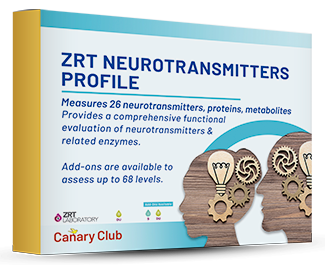Do you feel like your mind and body could be performing better?
Do you wish you could get more done or be happier and more at ease? Do you want to feel less lethargic, depressed, stressed, or anxious?
If any of your answers are YES, then it's possible that based on your diet, you've been starving your brain, and its important neurotransmitters, of the proper nutrition.
Today, many people focus on their weight and "dieting" to slim down. They try countless fad diets and even go so far as to nearly starve themselves for days at a time. However, our bodies and minds need food ― nutritious food ― to adequately and optimally perform the basic functions of thinking, moving, healing, protecting us from disease, and balancing our moods among many other functions.
The brain's neurotransmitters are essentially chemical messengers between the brain's neurons (nerve cells), and they strongly affect your mental, emotional, and physical activity (or lack of activity!). In order for your neurotransmitters to be at sufficient levels, they need various nutrients on a regular basis. Therefore, a consciously-planned diet with the right kinds and amounts of nutrients is critically important for optimum health, performance, and well-being.
Even at rest, our brains are very metabolically active and utilize 20-30% of our energy intake so you can imagine how critically important it is that we provide our brains with a steady amount of nutrition when we're awake and active! We don't want to jeopardize our sense of consciousness, awareness, and enjoyment of life by depriving our minds of healthy food, but we do without realizing it and then we stumble through life in a daze.
Since the '80s, in-depth studies at the Massachusetts Institute of Technology (MIT) have shown that what we eat can also both prevent and solve health problems such as depression, insomnia, hyperactivity, chronic pain, and carbohydrate cravings.
More recently, a 2008 review of nutritional therapies in Nutrition Journal emphasized that "depression has for some time now been known to be associated with deficiencies in neurotransmitters such as serotonin, dopamine, noradrenaline, and GABA" with the good news that "the amino acids tryptophan, tyrosine, phenylalanine, and methionine are often helpful in treating many mood disorders, including depression" because they produce the needed neurotransmitters.
If you ever tackle depression, Nutrition Journal's 2008 study specifically found that "omega-3 fatty acids, vitamin B (e.g., folate), and magnesium deficiencies have been linked to depression" as well. Omega-3 polyunsaturated fatty acids can be obtained by eating fatty fish (such as salmon), flax, nuts, and seeds. These are much better for you than the omega-6 fatty acids from vegetable oils (such as corn, cottonseed, and soybean) found in most fried and processed foods. Sources of Vitamin B are leafy greens, fruits, and legumes, and sources of magnesium are leafy greens, whole unrefined grains, nuts, seeds, and legumes.
Although other vitamins and minerals are extremely important, it is amino acids that allow the creation of neurotransmitters so you need to be sure you're including sufficient quantities in your diet. 
Complete amino acids come from high-protein foods such as:
- red meat, poultry, and fish
- eggs, dairy products (such as cheese and milk), and tofu
- legumes, nuts, and grains (such as oats)
You can also supplement your diet with incomplete amino acids which are found in high-protein fruits and vegetables such as:
- spinach, asparagus, broccoli, and seaweed
- avocados, dried fruits, and bananas
Below are six of the key neurotransmitters that you should become familiar with including their primary functions and their needed amino acid(s) or, in one case, the B vitamin known as choline.
Serotonin
- Regulates mood, appetite, sleep, pain, temperature, and impulse control
- Created from the amino acid tryptophan (with adequate vitamins of B1, B3, B6, and folic acid)
Dopamine
- Provides energy, alertness, arousal, and a proper immune and nervous system
- From the amino acid tyrosine and phenylalanine (with adequate oxygen, vitamins B3, B6, and C, folic acid, iron, and copper).
- Highly vulnerable to oxidation, stress, and inadequate sleep!
Epinephrine (Adrenaline)
- Provides motivation, alertness, concentration, arousal, and metabolism
- From the amino acids tyrosine and phenylalanine (with adequate oxygen, vitamins B3, B6, and C, folic acid, iron, and copper)
Norepinephrine (Noradrenaline)
- Also provides motivation, alertness, concentration, arousal, and metabolism
- Also from the amino acids tyrosine and phenylalanine (with adequate oxygen, vitamins B3, B6, and C, folic acid, iron, and copper)
Two other important neurotransmitters are GABA which calms nervous activity and Glutamate which aids learning, memory, and cognition and also helps mediate the central nervous system. Both are formed from the amino acid glutamic acid.
Finally, the neurotransmitter Acetylcholine is formed not by an amino acid, but by choline, which is found in meats (including beef liver), egg yolks, soybeans, wheat germ, nuts, flaxseeds, and broccoli. Acetylcholine is very important for optimal mental function (including memory) and muscle control.
Now that you know your brain's main neurotransmitters and how important it is to have a healthy amount of them in your brain, you're probably wondering if you have sufficient or deficient levels ― or too much of any of them! Well, you don't have to remain in the dark.
With our effective, convenient, and affordable at-home neurotransmitter tests and our group of healthcare practitioners, you can now find out what exact levels of neurotransmitters you have and how you can immediately strengthen your health and diet to enjoy a better life!
ZRT Neurotransmitters Profile
 See our ZRT Neurotransmitters Profile to check your neurotransmitter levels. Samples are taken from dried urine, with the exception of the saliva steroids add-on option.
See our ZRT Neurotransmitters Profile to check your neurotransmitter levels. Samples are taken from dried urine, with the exception of the saliva steroids add-on option.
Neurotransmitters Test Kit Includes:
Neurotransmitters Dried Urine: GABA, Glu, Gly, DA, Epi, NE, HIST, 5-HT, PEA, DOPAC, HVA, 5-HIAA, NMN, VMA, Trp, Kyn, 3-OHKyn, Tau, Gln, His, N-MeHist, Tyra, KynAc, Xanth, Tyr, Crtn
Available Neurotransmitter Add-ons:
You will be able to include these add-ons during the ordering process for the Neurotransmitters Panel.
Neurotransmitters + Saliva Steroids Concerned about hormone imbalances? Use the tube in the Neurotransmitter kit to collect a Saliva sample for Estradiol, Progesterone, Testosterone, DHEA-S & AM Cortisol.
Neurotransmitters + Diurnal Cortisol (UDH) I Don't want to test Melatonin. Add only Free Cortisol & Free Cortisone x4 to the same samples being collected for Neurotransmitters.
Neurotransmitters + Diurnal Cortisol & Melatonin UDH II - For concerns about adrenal or sleep issues, add 4-point Cortisol, Cortisone & Melatonin to the same samples being collected for Neurotransmitters.
Neurotransmitters + Diurnal Cortisol, Melatonin, Norepinephrine & Epinephrine UDH III For concerns about adrenal or sleep, stress issues, add Free Cortisol x 4, Free Cortisone x 4, Melatonin (MT6s) x 4, NE x 4 & Epi x 4 to the same samples being collected for Neurotransmitters.
add 7 Toxic Heavy Metals Urine Elements – $99 – Add tests for Iodine, Bromine, Selenium, Lithium, Arsenic, Cadmium & Mercury
Additional Resources
- Neurotransmitter Fact Sheet
- Neuroendocrine Imbalances and Depression
- Our Emotions Reflect Our Neurotransmitter Hormone Balance
- Why You Might Be Starving Your Brain
- Dopamine and New Year's Resolutions
- Neurotransmitter Disruption and Adrenal Function
- Neurotransmitter Imbalances and Mood Disorders
- Forbes Article



